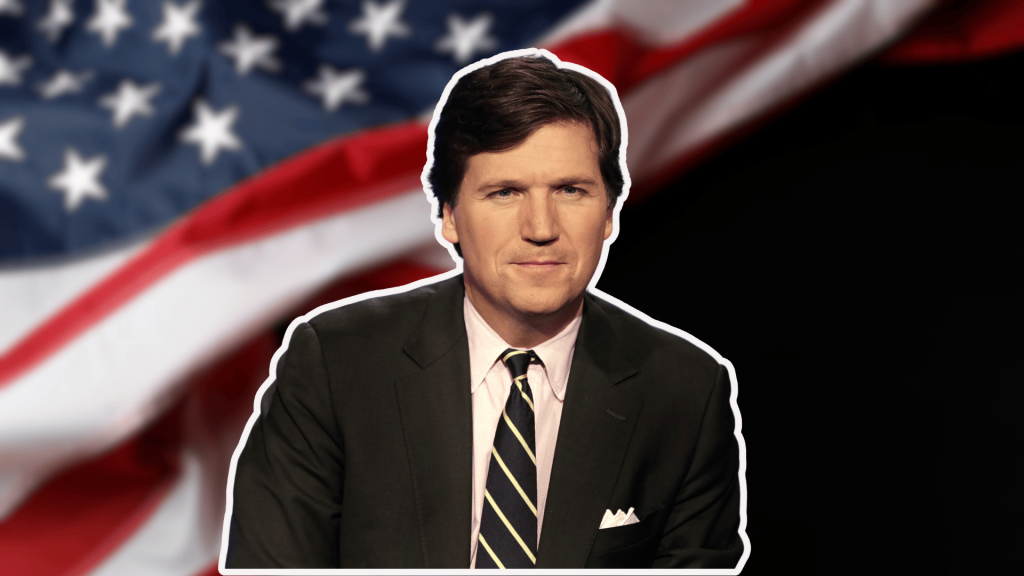Tucker Carlson has established himself as one of America’s most influential media personalities over a 25-year career that spans multiple platforms.
From his early days at CNN and MSNBC to his high-profile tenure at Fox News and his current independent ventures,
Carlson has strategically built both his brand and financial portfolio.
Born into a connected family in San Francisco in 1969, his path was shaped by privileged education and his father’s diplomatic career.
Despite his controversial public persona and outspoken conservative commentary, Carlson maintains a significant level of privacy regarding his personal life.
His business acumen has led to diverse investments beyond broadcasting, particularly in luxury real estate and digital media ownership.
Net Worth of Tucker Carlson ≈ $50 Million
Tucker Carlson’s net worth in 2025 is estimated to be between $30 million and $50 million, with this wide range reflecting conflicting reports about his various income sources.
Most financial experts agree that his wealth primarily comes from his 25-year media career, including the substantial $35 million annual salary he commanded at Fox News.
After departing Fox News in 2023, Carlson launched his subscription-based media platform and podcast, reportedly generating between $12 and $38 million annually.
The often-cited $190 million inheritance from the Swanson frozen food empire remains disputed, as the Swanson family sold their company decades before Carlson’s connection to the family.
His financial course has demonstrated remarkable growth since his early media days; his 2025 net worth represents a significant increase from previous estimates.
Net Worth Evolution Over Time
Tracking Carlson’s financial revolution reveals a steady climb from modest beginnings to substantial wealth accumulation, paralleling his rise in influence within conservative media.
| YEAR | NET WORTH | KEY CAREER MILESTONES |
|---|---|---|
| 2005 | $2 million | MSNBC host, co-founded The Daily Caller |
| 2016 | $10 million | Launched Tucker Carlson Tonight on Fox |
| 2020 | $30 million | Peak Fox salary ($35M/year); sold Daily Caller |
| 2023 | $30-$40 million | Fired from Fox; launched Tucker Carlson Network |
| 2025 | $30-$50 million | Post-Fox ventures: real estate investments |
This financial progression demonstrates how Carlson’s strategic career moves and media presence have translated directly into wealth.
His post-Fox ventures position him for greater financial success despite the uncertainty in his estimated net worth.
Tucker Carlson’s Diversified Investments
Tucker Carlson’s wealth strategy includes more than media earnings, with luxury real estate being a key investment focus.
His investments shifted after inheriting around \$20 million, contrary to reports claiming a \$190 million inheritance.
Carlson’s decision to leave Fox News helped him avoid restrictive contracts and research independent income opportunities.
Financial documents suggest he diversified into sectors beyond media, although exact investment details remain mostly undisclosed to the public.
Advisors reportedly recommend a conservative approach, prioritizing stable growth over high-risk ventures despite his bold public image.
Fun Fact: Carlson owns a $5.5 million waterfront estate in Florida and a secluded retreat in Maine, where he reportedly “unplugs” from political debates.
Major Assets
Carlson’s primary assets include his media empire, most notably the Tucker Carlson Network, which he launched after leaving Fox News.
His former ownership stake in The Daily Caller, which he sold in 2020, contributed significantly to his wealth accumulation.
His subscription-based platform generates substantial revenue, with estimates indicating earnings between $12 and $ 38 million annually from this venture alone.
Intellectual property rights to his brand and content library represent an increasingly valuable portion of his overall asset portfolio.
The independence of his current media operations gives him greater control over monetization strategies compared to his previous corporate positions.
His brand, cultivated over decades in media, has become perhaps his most valuable asset, enabling diverse revenue streams.
Properties
Carlson’s real estate portfolio includes a $5.5 million waterfront estate in Florida, which serves as his primary residence.
He also maintains a secluded retreat in Maine, where he reportedly escapes from the political spotlight.
His known properties are valued at over $8 million combined, representing significant investments beyond his media career.
Property records indicate that he strategically timed his real estate acquisitions,
often purchasing in upscale markets before significant valuation increases.
His Florida property benefits from the state’s favorable tax environment, potentially offering financial advantages beyond the property’s intrinsic value.
Overall Career Earnings
Tucker Carlson’s 25-year media career has generated substantial earnings, with his Fox News salary reaching a peak of $35 million annually.
His co-founding and subsequent sale of The Daily Caller significantly increased his wealth, particularly after he divested himself of ownership in 2020.
Since leaving Fox News, Carlson’s independent media ventures continue to generate a substantial income, with his subscription platform and podcast earning between $12 million and $38 million annually.
The disputed Swanson inheritance, while likely smaller than often reported, contributed to his financial foundation earlier in his career.
Industry analysts note that his total career earnings rank him among the highest-paid media personalities in the history of conservative broadcasting.
His ability to monetize controversy has proven particularly lucrative, with viewership and subscription numbers often rising after public disputes.
The longevity of his career, spanning multiple networks and platforms, demonstrates remarkable adaptability in a rapidly changing media landscape.
Tucker Carlson’s Private Life
Tucker Carlson maintains a significant level of privacy regarding his personal affairs, despite his prominent public persona and a controversial television career.
Born in 1969 in San Francisco to Richard Warner Carlson, a former diplomat, Carlson experienced a privileged upbringing that influenced his later perspectives.
His childhood took an unexpected turn after his biological mother left the family when he was just six years old, shaping his early family experiences.
His father’s subsequent marriage to Patricia Swanson connected him to the food empire family, though the extent of financial benefits remains disputed.
The contrast between his public conservative commentary and private lifestyle has become a subject of interest among media analysts and critics alike.
Despite extensive public exposure, Carlson deliberately keeps certain aspects of his family life shielded from the intense scrutiny of public attention.
Early Life
Tucker Carlson was born into a media-connected family. His father served as the director of Voice of America and held other prominent positions.
After his mother’s departure, he was primarily raised by his father and his stepmother, Patricia Swanson, heiress to the Swanson food fortune.
He attended prestigious educational institutions, including St. George’s School in Rhode Island and later Trinity College in Connecticut.
His formative years in an upper-class environment helped shape the connections that would later benefit his media career.
His early exposure to political and diplomatic circles through his father’s career influenced his later interest in political commentary.
Career Beginnings
Carlson’s media career began with writing for publications like The Weekly Standard and other conservative-leaning outlets.
His television debut came as a commentator on CNN programs, where he quickly established his confrontational style.
Co-hosting “Crossfire” on CNN in the early 2000s brought him wider recognition, particularly after a famous confrontation with Jon Stewart.
After CNN, he transitioned to MSNBC, continuing to develop the provocative persona that would become his trademark.
The founding of “The Daily Caller” in 2010 marked his entry into digital media ownership and entrepreneurship.
His early career demonstrated a pattern of leveraging controversy into greater visibility and subsequent financial opportunities.
Tucker Carlson’s Future Investment Goals
Tucker Carlson’s financial advisors have reportedly outlined ambitious expansion plans for his independent media enterprise over the next five years.
Industry insiders suggest his strategy involves leveraging his subscriber base to launch additional content verticals beyond political commentary.
Real estate remains a cornerstone of his investment strategy, with rumors of additional property acquisitions in tax-favorable jurisdictions.
Financial publications report his interest in diversifying into entertainment production, potentially creating documentary content separate from his regular programming.
Media analysts speculate that building a sustainable independent media company represents his primary financial goal rather than maximizing short-term revenue.
The potential monetization of his extensive content library through licensing deals could provide significant passive income streams in future years.
Philanthropy and Charity Work
Tucker Carlson’s philanthropic activities remain less publicized than his media career, with limited information available about his charitable giving.
Reports suggest modest contributions to veterans’ organizations and educational institutions, though specific donation amounts remain largely undisclosed.
His public statements have occasionally highlighted support for rural community development initiatives, particularly in areas with economic challenges.
Critics note the relative lack of transparency regarding his charitable work compared to other public figures with similar wealth levels.
Financial journalists have observed that his giving patterns appear to focus on smaller, targeted causes rather than large institutional donations.
Conclusion
Tucker Carlson’s financial voyage reflects his remarkable ability to monetize controversy and adapt to changing media landscapes.
From modest beginnings, he has changed himself into a media empire, with assets including his Tucker Carlson show.
Network, valuable intellectual property rights, and substantial real estate holdings in Florida and Maine.
His investment strategy demonstrates a preference for stable growth over high-risk ventures.
Looking forward, Carlson appears focused on expanding his independent media enterprise beyond political commentary while continuing to invest in tax-favorable jurisdictions.
While his philanthropic activities remain less publicized than his media career,
His overall career strategy showcases how strategic positioning and brand cultivation can translate into significant wealth accumulation.








